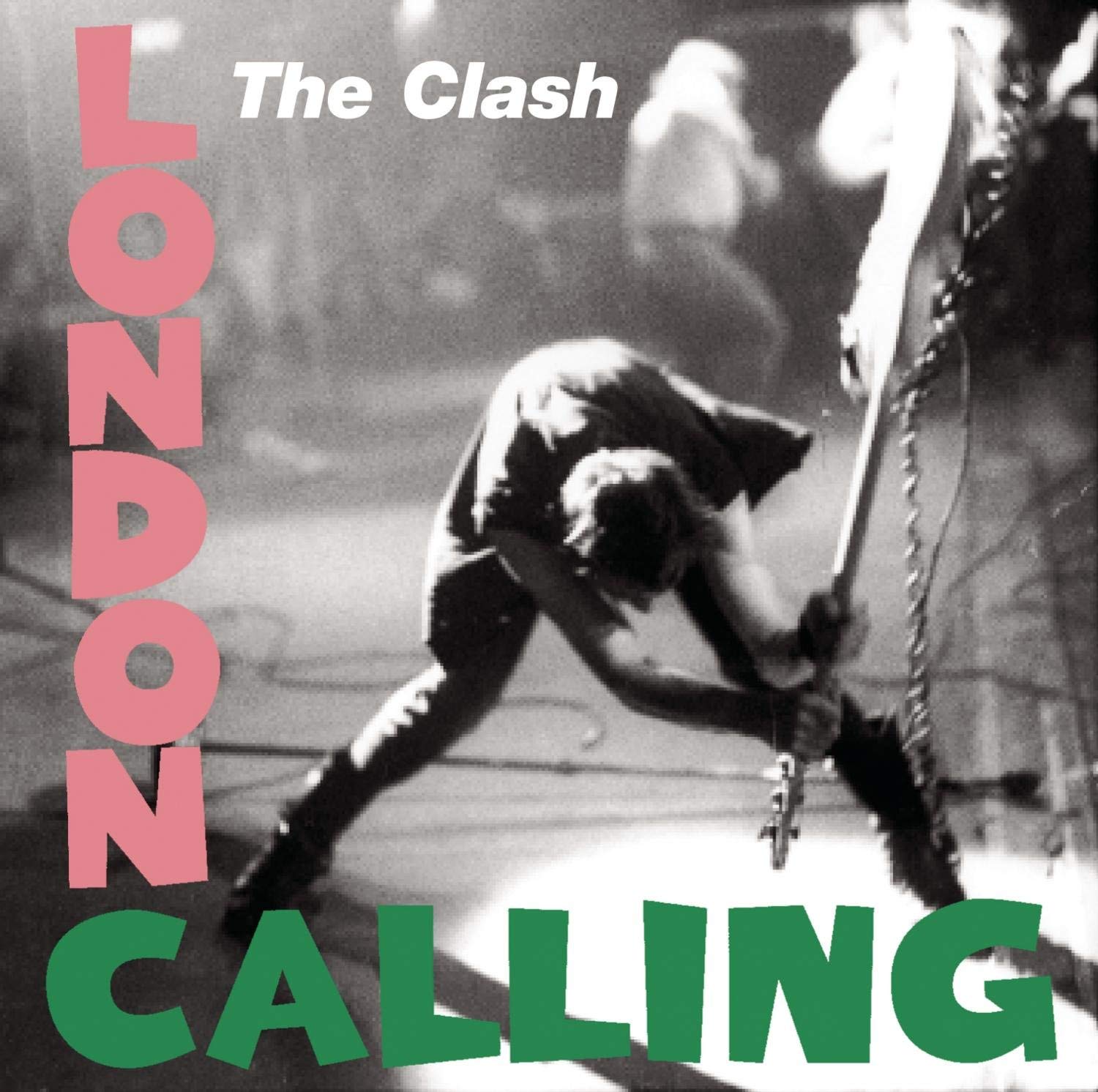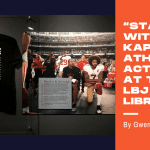On February 7, Seattle’s non-profit broadcaster KEXP headed to London for their seventh annual International Clash Day. In celebration of The Clash’s London Calling turning 40 in December 2019, KEXP organized a 4-day live broadcast in Seattle and London, featuring performances from contemporary bands and covers of The Clash’s songs. Their intention was to highlight the “enduring influence” of The Clash’s music as well as their “human rights message.” Released in the UK in December 1979 and in the US in January 1980, London Calling is widely recognized as one of the most influential albums of the twentieth century. Rolling Stone listed it as the eighth best album of all time, Q Magazine listed it at number 20, and the NME placed it at number 39.
The Clash are tied to punk’s emergence in 1976. After the band made its live debut supporting the Sex Pistols in Sheffield in 1976, The Clash became one of the key players in London’s punk scene. By January the following year, The Clash had signed with CBS Records for £100,000 and in April they released their self-titled debut album. The record deal was considered an astronomical fee by the music press and fans alike. Mark Perry, founder of influential punk fanzine Sniffin’ Glue, claimed, “punk died the day The Clash signed to CBS.” Nonetheless, The Clash’s debut record was still recognizably a punk record. London Calling, however, reflected the band’s exploration into styles of music that transcended their punk origins, such as rock and roll, reggae, and ska. In spite of their substantial record deal, The Clash struggled financially. By 1979, The Clash was largely in debt and they were at war with their record company. They needed a commercial success and fast. London Calling delivered, selling around two million copies upon its release. In the UK, it was certified gold in December 1979 and in the US it peaked at number 27 on the Billboard Pop Albums chart.

Cover of the first edition of Sniffin’ Glue (via Wikipedia)
In addition to its diverse range of musical influences, London Calling’s success derived from its sociopolitical content. In the album’s title track, Joe Strummer declared, “we ain’t got no swing, ‘cept for the ring of that truncheon thing.” Strummer was referring to the collapse of what Time had labeled “Swinging” London in the 1960s, evoking police truncheons and riots in the city to elucidate a growing sense of turmoil in the 1970s. After the optimism of the 1960s, London seemed culturally and politically stagnant. But these changes were not just limited to the city of London. London Calling was released at a critical moment in Britain’s post-war history: unemployment was on the rise; there were frequent trade union strikes in 1973 and 1974; the British government sought a loan from the IMF in 1976; and ongoing disputes between James Callaghan’s Labour government and trade unions during the coldest winter for 16 years was dubbed the “Winter of Discontent” in 1978 and early 1979. Britain, once a manufacturing and imperial powerhouse on the global stage, was perceived to be in sociopolitical disarray. The overarching sense of doom and disorder was a large factor in Thatcher’s election in May 1979. Not only this, but the punk movement seemed to have lost its early momentum as an articulation of political and cultural discontent. “Phony Beatlemania” Strummer dubbed it, had “bitten the dust.”
Even though historians such as Jim Tomlinson and Andy Beckett have argued that the doom and gloom of the 1970s tends to be exaggerated, The Clash spoke to genuine political discontent and a seemingly desolate socioeconomic climate. Their earliest songs were particularly scathing about the state of the world. “White Riot” expressed exasperation at the lack of white working-class struggle, claiming “all the power’s in the hands, of people rich enough to buy it, while we walk the street, too chicken to even try it.” “London’s Burning” reflected on cultural stagnation and crippling boredom and “I’m so Bored with the U.S.A.” critiqued American imperialism: “Yankee dollar talk, to the dictators of the world, in fact it’s giving orders, and they can’t afford to miss a word.” The Clash was one of the more overtly political punk bands, using punk’s fast-paced, urgent, and aggressive style to critique 1970s society from the left.
London Calling continued in this vein, with most of its songs predictably centered on London. “Jimmy Jazz” and “Guns of Brixton” tell the stories of fictional characters in the city’s criminal underbelly. “Rudie Can’t Fail,” a heavily ska-influenced song, documents how young first-generation immigrant men, known as “rude boys,” were often subject to scorn from the British white middle class. The Clash also described how young people often neglect their idealism and political views once they get older and more comfortable in “Clampdown.” In “Spanish Bombs” the band drew comparisons between the Spanish Civil War in the 1930s and the rhetoric of Basque nationalists of the late 1970s. “Lost in the Supermarket,” offers a critique of consumerism as a key reason for political apathy and “Lovers Rock” endorses safe sex and family planning. Finally, the title track and album opener depicts a scene of rising unemployment, racial tensions, and drug use. London Calling is a scathing sociocultural commentary of the 1970s. This was reflected on International Clash Day when KEXP spotlighted various social justice organizations “because The Clash was anti-racist, anti-fear, pro-solidarity, pro-unity, pro-inclusion.”
But questions about whether The Clash had sold out never went away. To some, these doubts undermined the legacy of London Calling with regard to its political message. Others see a more complex history. American artist and activist, Mark Vallen, argued in 2002 that even though The Clash had sold out by allowing Jaguar to use “London Calling” to advertise cars, its original composition had been in keeping with the punk ethos. “When The Clash released London Calling,” he claimed, “the song was one of the band’s most chilling works. Ominous and dark, it foretold of the Western world collapsing in a spasm of war and out of control technologies, it addressed our fears of government repression.” Although some people in the punk movement believed The Clash had already sold out by this point, the initial excitement that London Calling generated was contingent on the authenticity of its political message.
London Calling’s continued popularity is largely down to a careful balancing act. The album could be called the greatest punk rock record of the era or it could be said that it is not a punk rock record at all. From a musical perspective, it is an amalgamation of various styles. Particularly, it pays homage to rock and roll. The album cover captures bassist Paul Simonon smashing his bass guitar on stage. This rock cliché is anchored by a logotype referencing Elvis Presley’s 1956 debut album. Musically, it was a nod to the past while incorporating an eclectic blend of contemporary styles. The three cover songs on the album emphasize this: “Wrong ‘em Boyo” and “Revolution Rock” were first recorded by reggae artists and the other was “Brand New Cadillac,” originally a rock and roll song from 1959. All three sound at home on the album next to the Clash’s original compositions.
London Calling undeniably helped bridge the divide between punk as music and punk as a historical moment. It normalized punk as a credible genre of music while articulating the sociopolitical grievances that British punks were reacting to: high unemployment, racial politics, and the sense that society around them was falling apart. The album has the feeling of a party during the apocalypse. From a historical perspective, even though The Clash had signed to a record label – a cardinal sin for a 70s punk rock band – their wide-ranging sociopolitical commentary encapsulated the cynical mood of the late 1970s. At the end of the title track there is a message in Morse code, created using Mick Jones’ guitar pickups, that spells out S-O-S. Amidst political crises in Westminster, London Calling’s apocalyptic tone is as relevant to Britain in 2019 as it was in the winter of 1979.




